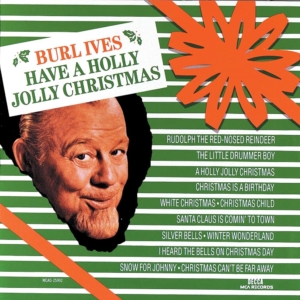DCPA NEWS CENTER
Enjoy the best stories and perspectives from the theatre world today.
Enjoy the best stories and perspectives from the theatre world today.
There are certain associations with Christmas. The smell of pine trees. The taste of gingerbread. The feel of a crisp winter day. The sight of snowflakes.
But when I think of the sound of Christmas, I think of Burl Ives.

Burl Ives
My parents had that old record player…you know the one I mean, the one that took up half a wall and was its own piece of furniture? Yeah, that one. Nice. Nestled inside were a selection of records from the 50s, 60s and 70s. Every Christmas we’d pull out an album by Burl Ives, which was always my favorite. It included:
A Holly Jolly Christmas
Rudolph the Red-Nosed Reindeer
Santa Claus Is Coming to Town
White Christmas
Winter Wonderland
Silver Bells
With the sounds of Christmas ringing in my ears, I eagerly awaited the one evening of the whole year when Burl Ives would narrate the NBC airing of “Rudolph the Red-Nosed Reindeer.” Unlike today when you can stream your favorite holiday shows 24/7, children throughout America sat with their families to see that magical reindeer guide Santa on his journey to deliver presents to every good boy and girl.
It’s really hard to separate the holidays from Burl Ives.
 Born in 1909 to Levi “Frank” and Cordelia “Dellie” Ives, Burl Icle Ivanhoe Ives began his career at an early age when his uncle invited him to sing at a soldiers’ reunion. When a junior in college, he had a sudden epiphany, left class and never returned. Instead, he set out with his banjo to pursue a career in entertainment.
Born in 1909 to Levi “Frank” and Cordelia “Dellie” Ives, Burl Icle Ivanhoe Ives began his career at an early age when his uncle invited him to sing at a soldiers’ reunion. When a junior in college, he had a sudden epiphany, left class and never returned. Instead, he set out with his banjo to pursue a career in entertainment.
He launched his own radio show, ultimately becoming a household name on CBS Radio. He recorded songs independently and with the folk group The Almanacs, which used their microphone for political activism — first in opposition to World War II and later in support. Ives was ultimately drafted in the U.S. Army where they put his talent to use entertaining the troops as part of Irving Berlin’s The Is The Army and followed the show to Hollywood.
After leaving the military, he continued to record and act in films but was soon accused of having Communist ties. He agreed to cooperate with the House Un-American Activities Committee so that he could continue his career and preserve his income, but his friends in the folk music industry felt betrayed and accused him of naming names in the hunt for Communist sympathizers.
In the 1950s, he continued his movie career, appearing in such hits as East of Eden, Cat on a Hot Tin Roof and The Big Country for which he won an Academy Award for Best Supporting Actor. Soon, he crossed over into television and country music and ultimately lent his warm tones to what was to become a Christmas classic — “Rudolph the Red-Nosed Reindeer” which he narrated as Sam the Snowman in addition to performing the songs “Holly Jolly Christmas,” “Silver and Gold” and the title song.
Ives continued performing on television, film and vinyl until the late 1980s, which he officially retired in 1989. A longtime smoker of pipes and cigars, Ives was diagnosed with oral cancer in 1994 and died the following year. Upon his death, he was described by The Washington Post as “a 20th century minstrel and balladeer who brought new life and popularity to some of America’s oldest folk music with songs of children, history, animals insects and loves won and lost.”
For me, he remained the sound of Christmas.
